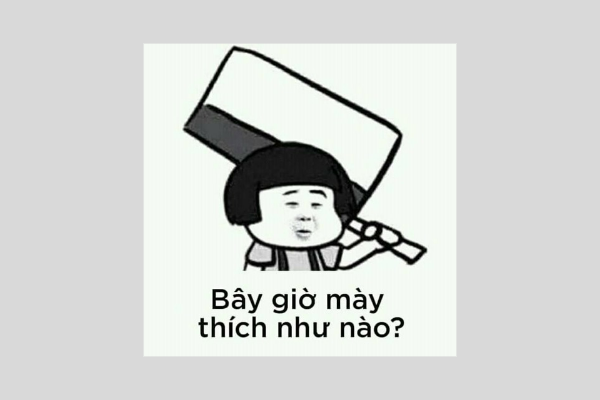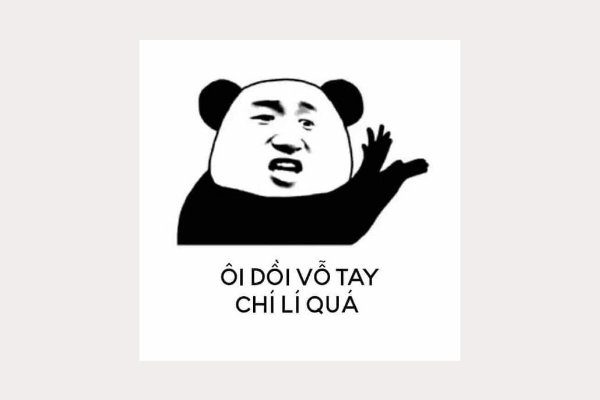
Tổng hợp 100+ Meme Gấu Trúc Bựa Vui Nhộn, Hài Hước, Độc Đáo - Coolmate
Cười lăn với bộ sưu tập 100+ meme gấu trúc bựa, hài hước và độc đáo nhất được Coolmate tổng hợp. Khám phá ngay!
Ngày nay, meme đã trở thành một phần không thể thiếu trên Internet. Từ những hình ảnh đơn giản ban đầu, "cuộc chơi" meme ngày càng trở nên thú vị và sáng tạo hơn với sự xuất hiện của nhiều hình tượng mới lạ.
Nổi bật trong số đó, meme gấu trúc đang "làm mưa làm gió" trên mạng xã hội bởi cách thể hiện độc đáo, vừa gần gũi vừa hài hước. Loạt meme này xuất hiện ở khắp mọi nơi, từ phần bình luận của các bài đăng cho đến những cuộc trò chuyện của giới trẻ. Trong bài viết này, hãy cùng Coolmate khám phá bộ sưu tập gấu trúc meme siêu hài hước và vui nhộn nhé!
1. Meme gấu trúc là gì?
Chắc hẳn bạn đã từng bật cười khi nhìn thấy chiếc meme gấu trúc với gương mặt biểu cảm "khó đỡ" - một bức ảnh đen trắng được vẽ nguệch ngoạc nhưng lại có khuôn mặt người.

Không quá cầu kỳ nhưng meme gấu trúc lại khiến cư dân mạng "dậy sóng"
Meme gấu trúc là một phần trong "vũ trụ" meme có tên Baozou manhua (暴走漫画). Nó có nét tương đồng với những meme thế hệ đầu như "troll face" và "forever alone" từng "làm mưa làm gió" một thời. Nếu như meme thế hệ cũ được thực hiện đơn giản bằng cách chắp vá hình ảnh thì meme Baozuo manhua cũng tương tự như vậy.

Meme gấu trúc là một phần trong “vũ trụ” meme Baozou manhua
Thời gian gần đây, meme gấu trúc được sử dụng rộng rãi bởi sự hài hước và gần gũi. Cư dân mạng đã sáng tạo nên vô vàn biểu cảm cho meme gấu trúc, từ hài hước, đáng yêu cho đến "căng cực", khiến người xem không thể nhịn cười.

2. Nguồn gốc của meme gấu trúc siêu hot hiện nay
Như đã nói, meme gấu trúc xuất phát từ "vũ trụ" Baozou manhua. Và Baozou manhua là sản phẩm của Wang Nima - một người Trung Quốc. Trước đó, ông là fan của trào lưu Rage comic của phương Tây và mong muốn tạo ra một thứ tương tự tại quê nhà.

Baozou manhua là sản phẩm của Wang Nima - một người Trung Quốc
Vào năm 2008, Wang Nima đã tạo lập website Baozou.com để đăng tải những sản phẩm của mình. Sau đó, trang web này trở thành nền tảng mở cho phép mọi người thỏa sức sáng tạo và đóng góp meme do chính mình tạo ra.
Mặc dù hiện tại website đã ngừng hoạt động nhưng độ nổi tiếng của Baozou manhua đã vượt ra khỏi biên giới Trung Quốc. Có thể nói, "di sản" mà Baozou để lại lớn hơn những gì Wang Nima nghĩ tới, đặc biệt là chiếc meme gấu trúc thú vị.

Meme gấu trúc được sử dụng cực kỳ phổ biến không chỉ ở Trung Quốc
Khuôn mặt meme gấu trúc là của ai?
Chủ nhân đầu tiên của khuôn mặt meme gấu trúc chính là "Ca thần" Trương Học Hữu - một trong "Tứ đại Thiên Vương" đình đám của Hồng Kông vào những năm 90 (cùng với Lưu Đức Hoa, Quách Phú Thành và Lê Minh).

Chủ nhân đầu tiên của khuôn mặt meme gấu trúc là "Ca thần" Trương Học Hữu
Khuôn mặt meme "viral" này thực chất là biểu cảm của Trương Học Hữu trong phim "Vượng Giác Ca Môn" (1988). Trong phim, nam ca sĩ thủ vai Dăng - đàn em của Hoa (Lưu Đức Hoa đóng), một tay anh chị có tiếng trong giới xã hội đen.

Biểu cảm của Trương Học Hữu là nguồn cảm hứng của nhiều meme gấu trúc
Là một chàng trai hiện đại, bên cạnh việc cập nhật meme, bạn cũng đừng quên chăm chút cho phong cách thời trang của bản thân. Ghé thăm Coolmate để khám phá những mẫu áo thun nam và quần short nam thời thượng và chất lượng nhé!

3. Vì sao meme gấu trúc được yêu thích như thế?
Biểu cảm đa dạng của meme gấu trúc thường được lấy cảm hứng từ những khuôn mặt người thật, bao gồm cả người nổi tiếng. Điển hình nhất là "Ca thần" Trương Học Hữu hay nam diễn viên Hàn Quốc Choi Sung Kook với khuôn mặt được cắt từ bộ phim hài võ thuật "Tam đại sư phụ" (2007).

Người được chế meme "nhiệt tình" nhất gọi tên Choi Sung Kook
Ban đầu, meme này chỉ phổ biến ở Trung Quốc. Nhờ sức ảnh hưởng của Internet và mạng xã hội, meme gấu trúc ngày càng lan rộng và được yêu thích ở nhiều quốc gia khác. Ưu điểm của chiếc meme "vạn người mê" này là có thể dễ dàng chỉnh sửa để phù hợp với mọi hoàn cảnh.
Bạn hoàn toàn có thể tự tạo meme gấu trúc với khuôn mặt của mình hoặc bạn bè chỉ với vài bước chỉnh sửa đơn giản.

Chỉ với vài bước chỉnh sửa đơn giản bạn đã có ngay bộ sưu tập meme "chất chơi"
Mặc dù xuất hiện chưa lâu nhưng meme gấu trúc rất được ưa chuộng trên các hội nhóm mạng xã hội tại Việt Nam. Đa số được sử dụng với sắc thái châm biếm, "cà khịa" hài hước.
>>> Bạn muốn in áo theo yêu cầu hình meme gấu trúc. Ghé ngay CoolXprint để tự thiết kế nên những chiếc áo độc đáo nhất và tự do thể hiện cá tính của bạn
{{{infobox}}}Tham gia CoolClub ngay để tận hưởng nhiều đặc quyền hấp dẫn từ Coolmate{{{/infobox}}
4. Tổng hợp 100+ meme gấu trúc vui nhộn, hài hước
Dưới đây là tổng hợp 100+ meme gấu trúc bựa, hài hước và độc đáo nhất mà Coolmate đã sưu tầm được. Cùng "thả ga" lựa chọn và sử dụng nhé!






























































































Lời kết,
Trên đây là bộ sưu tập meme gấu trúc hài hước, độc đáo và "trendy" nhất mà Coolmate đã tổng hợp. Hy vọng bạn đã tìm được cho mình những bức ảnh ưng ý và đừng quên chia sẻ cùng CoolBlog thêm nhiều meme thú vị khác nhé!
"Coolmate - Nơi mua sắm đáng tin cậy dành cho nam giới"

Xem thêm:
- Meme chó shiba inu nổi tiếng CĐM là ai? Top ảnh chó shiba bựa hài hước
- Rick Roll là gì? Meme Rick Roll bắt đầu từ đâu?
- Top 70 cap ngầu, chất lừ ấn tượng nhất 2022 cho các bạn trẻ
- Quỳnh aka là ai? 99+ hình ảnh về Quỳnh aka hài hước, dễ thương
- Người đàn ông chống nạnh là ai? Vì sao gây sốt như vậy?

Ngô Thúy Quỳnh
"When you have a dream, you've got to grab it and never let go"
Admin
Link nội dung: https://pi-web.eu/tong-hop-100-meme-gau-truc-bua-vui-nhon-hai-huoc-doc-dao-coolmate-1735891219-a2922.html